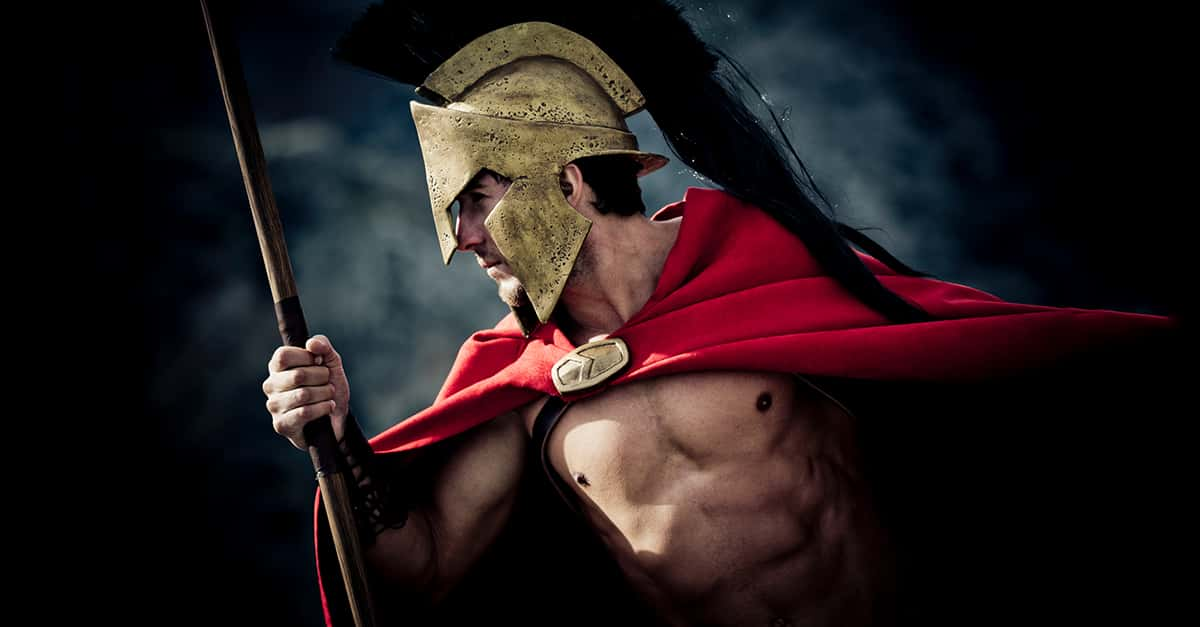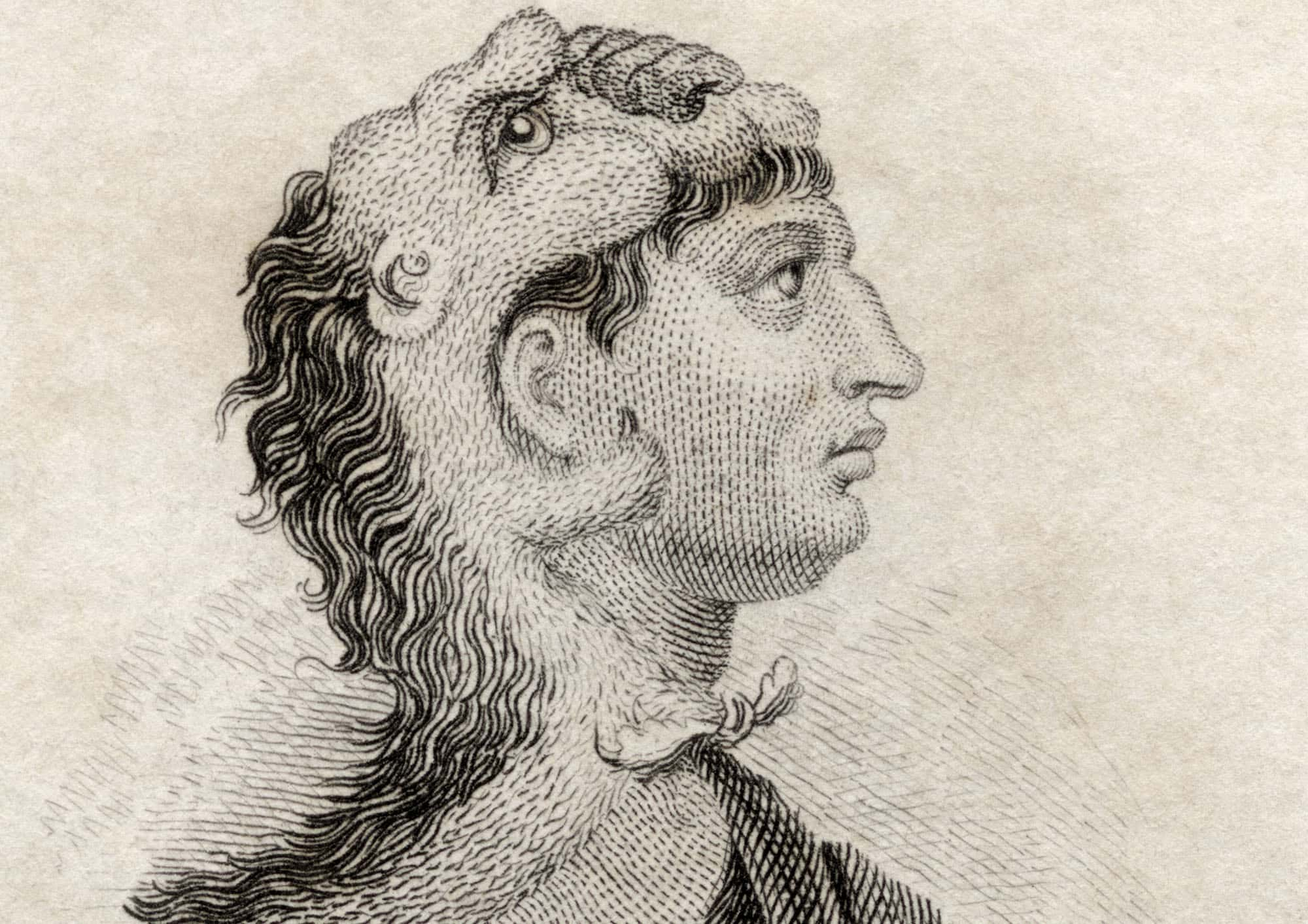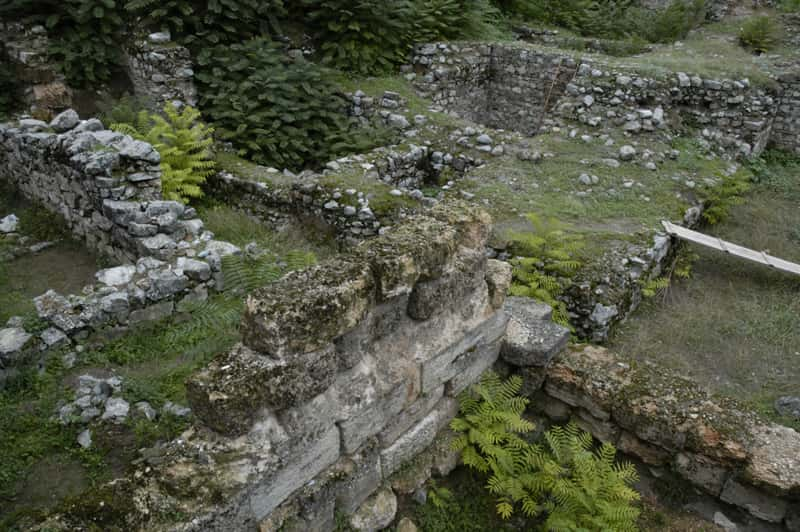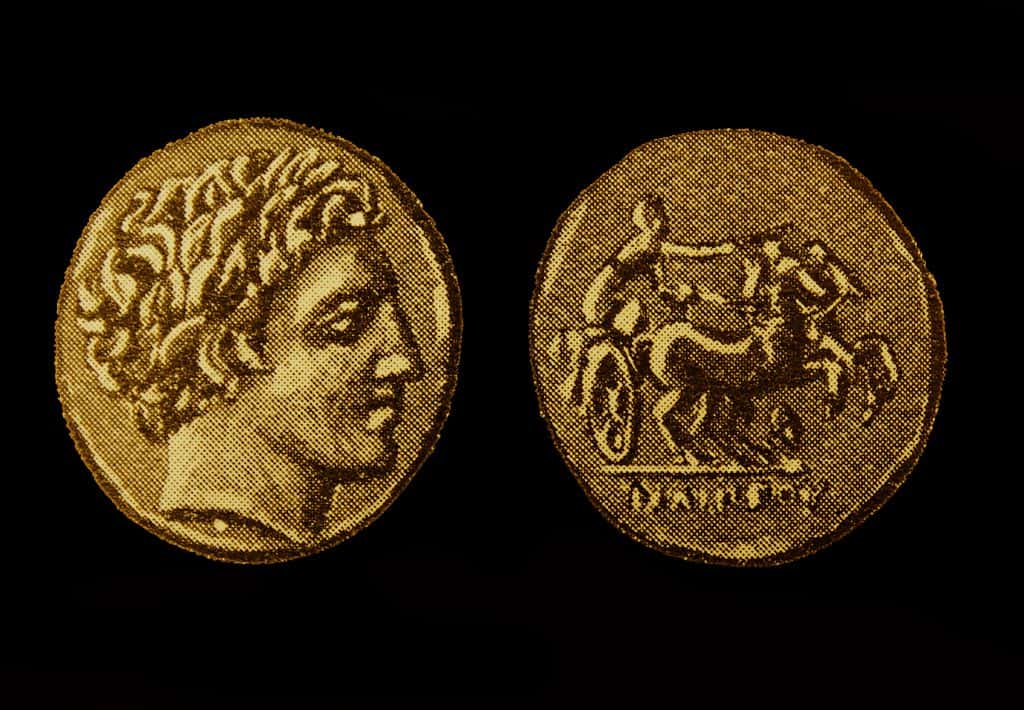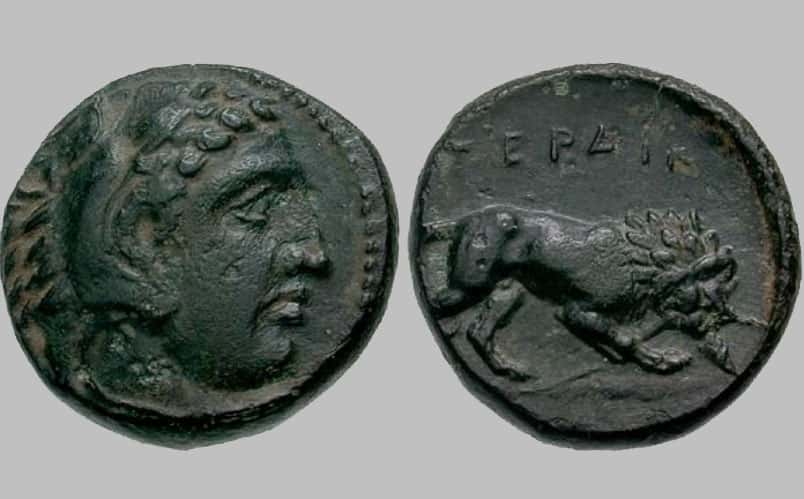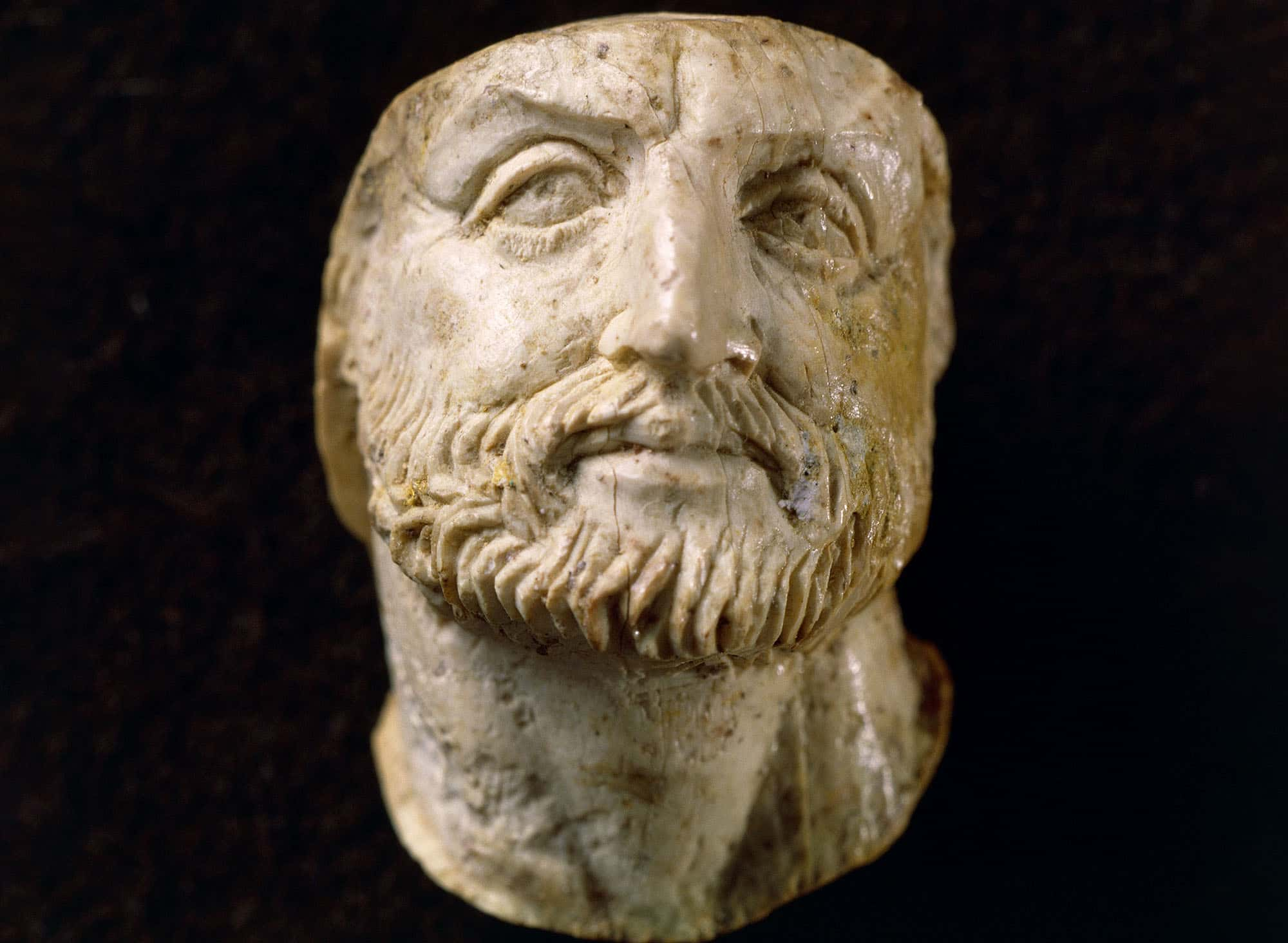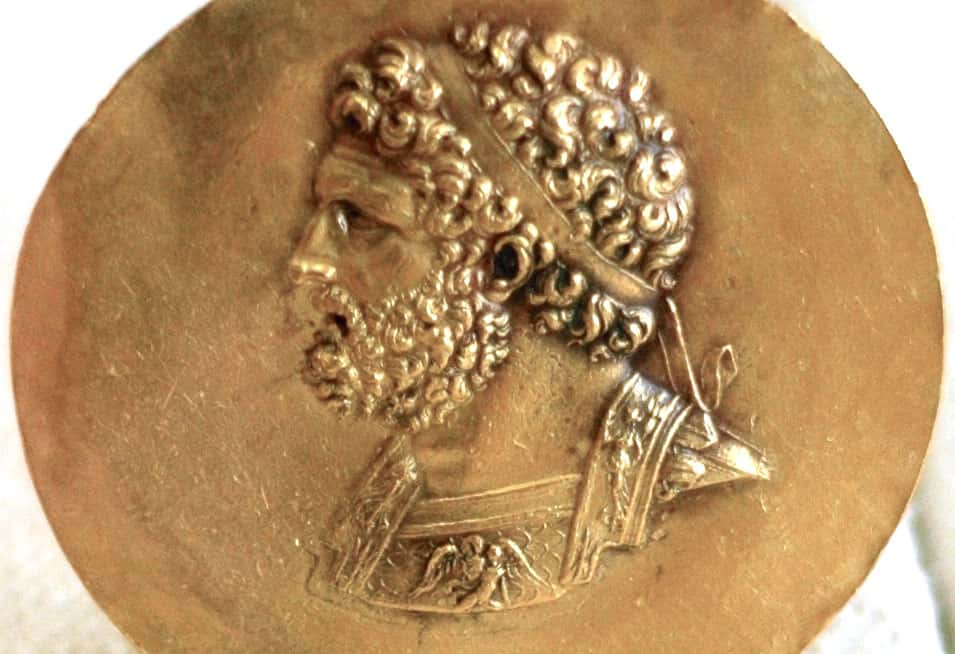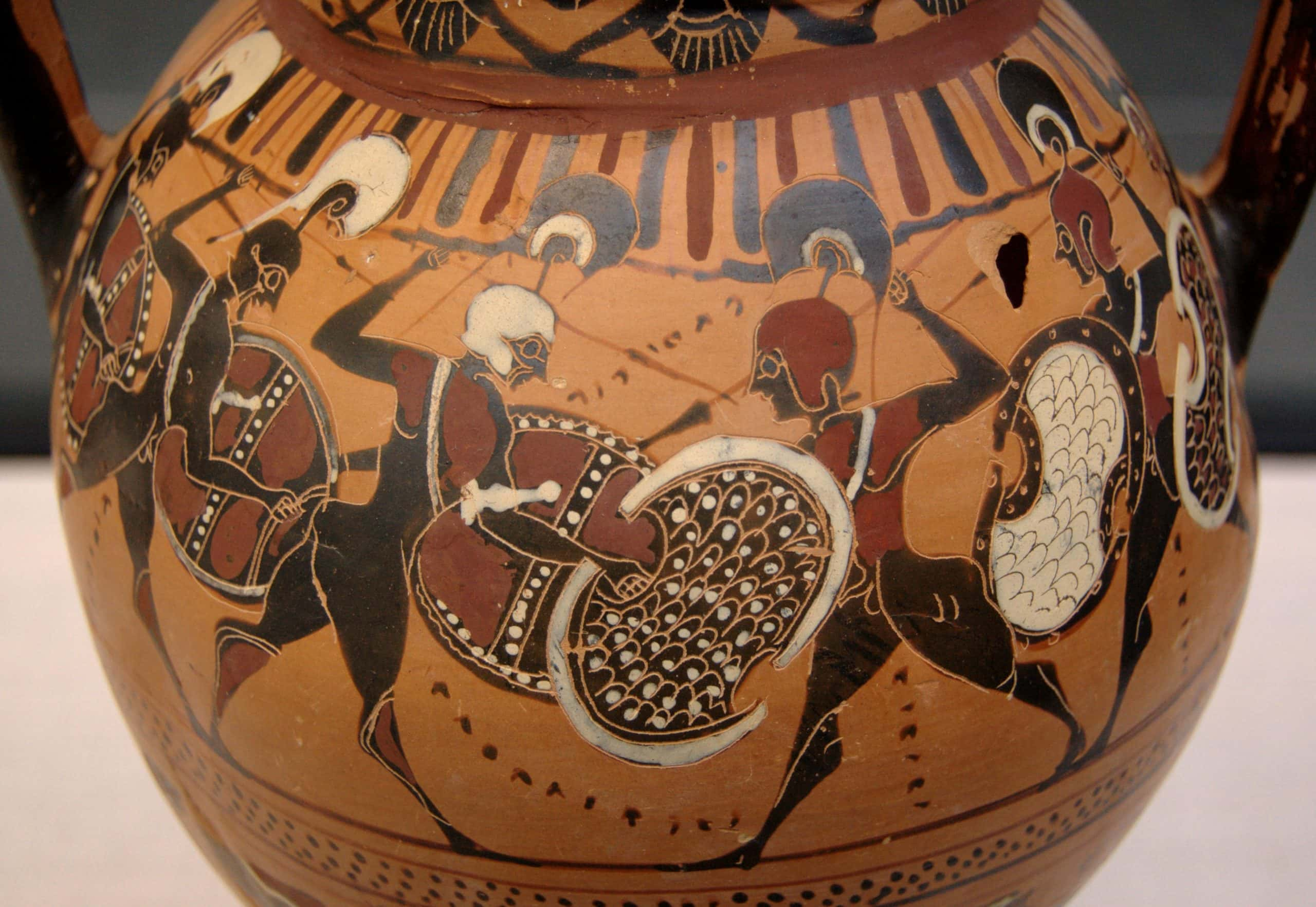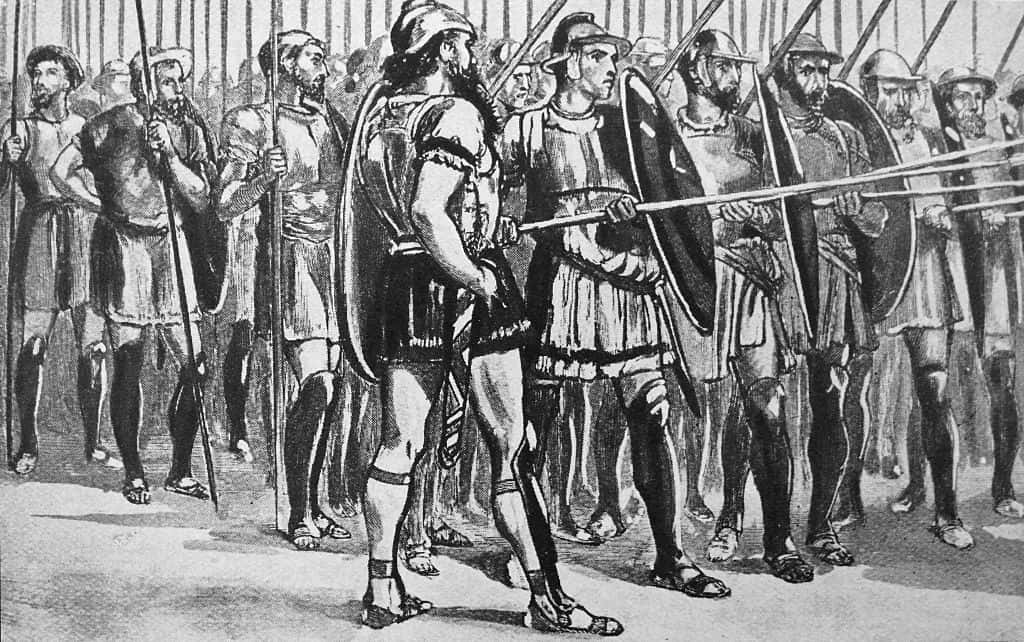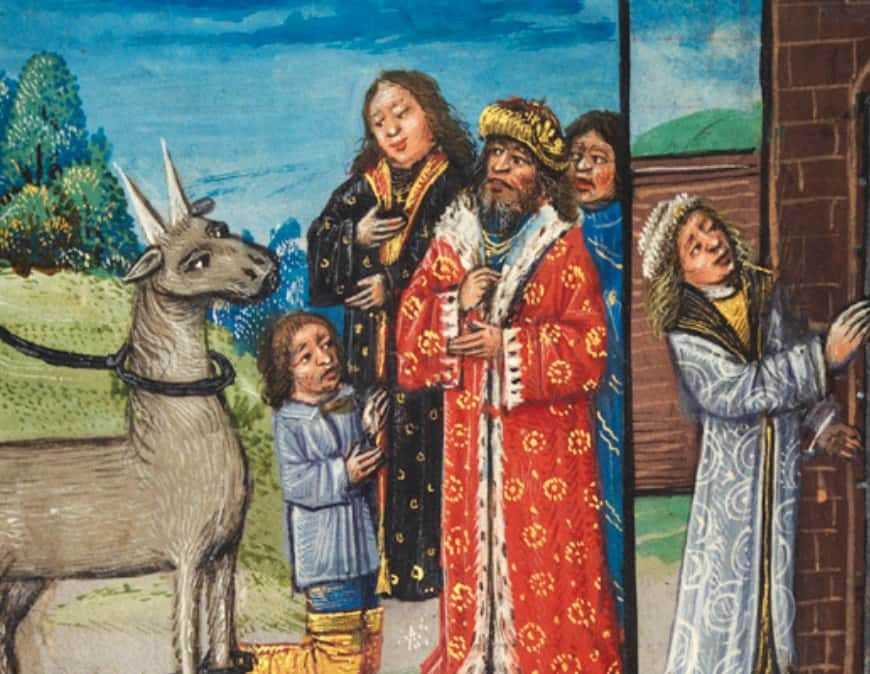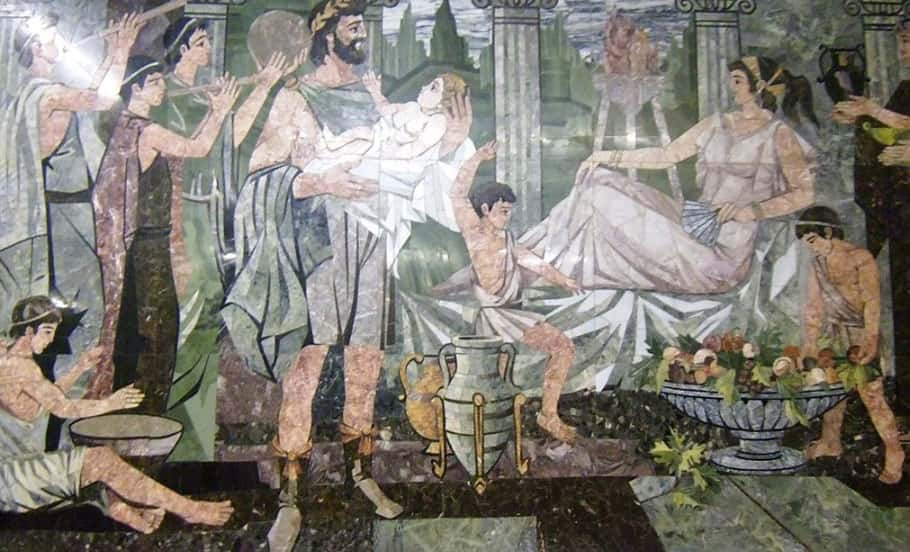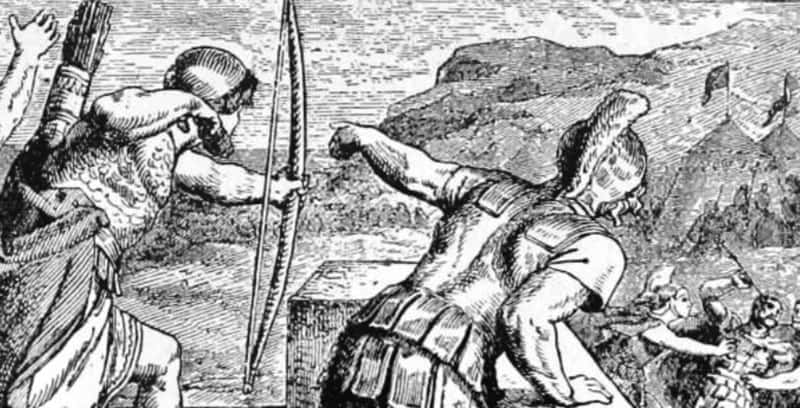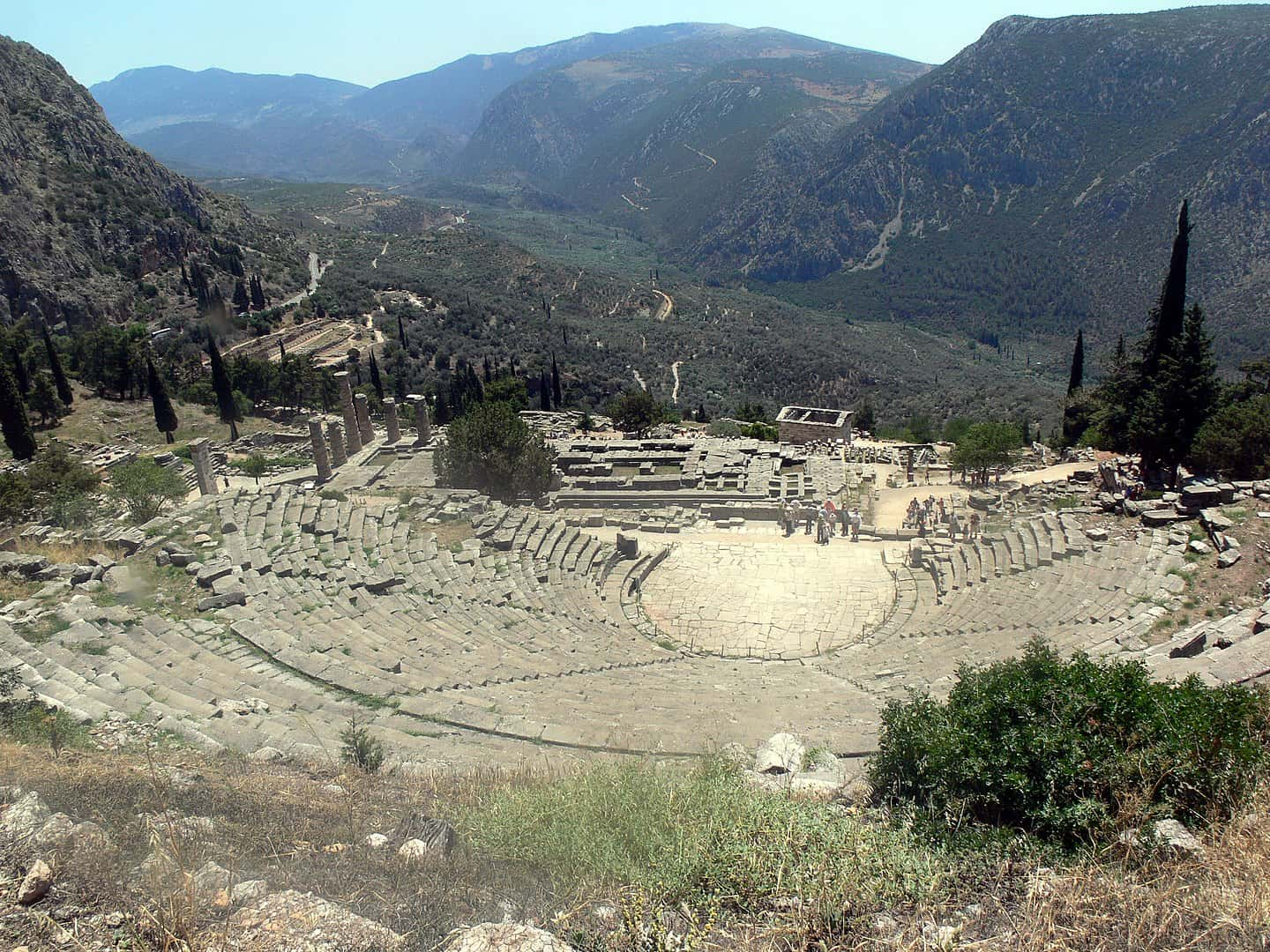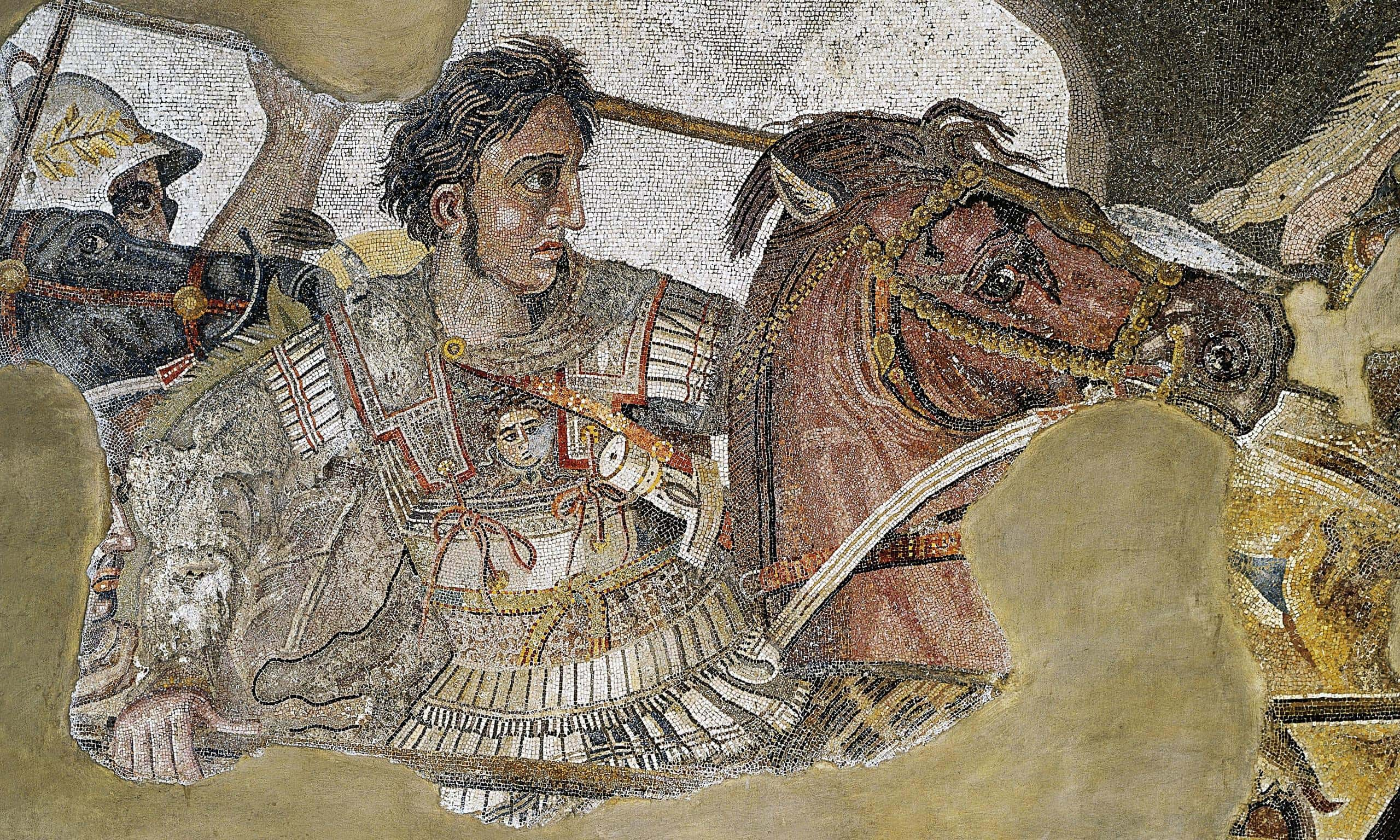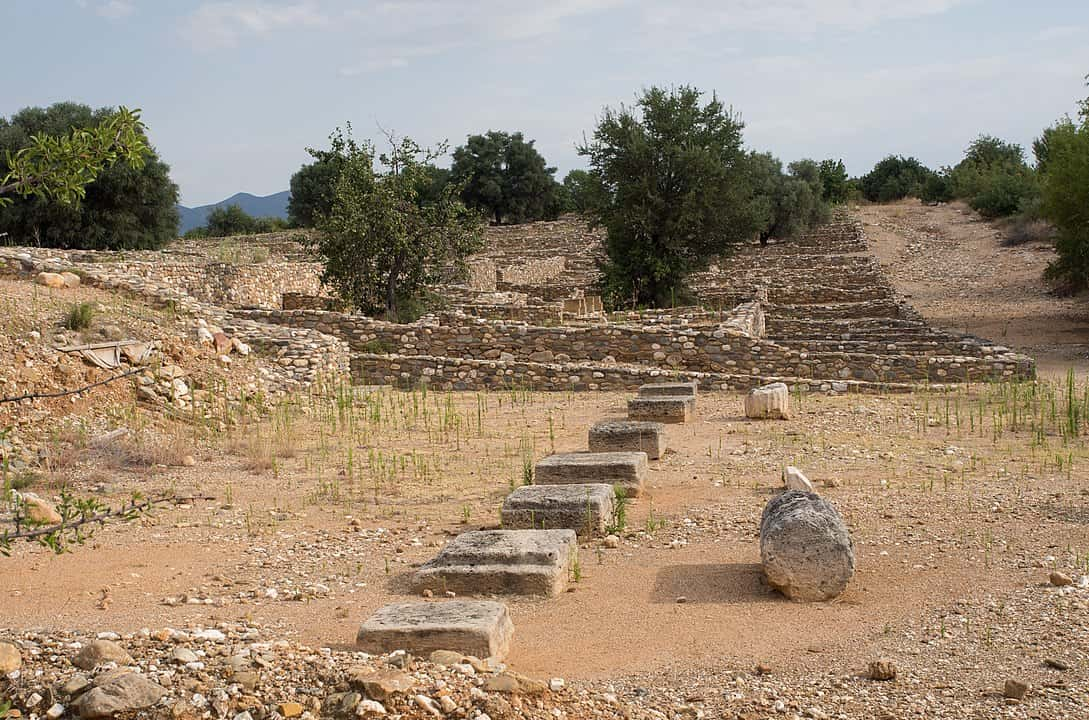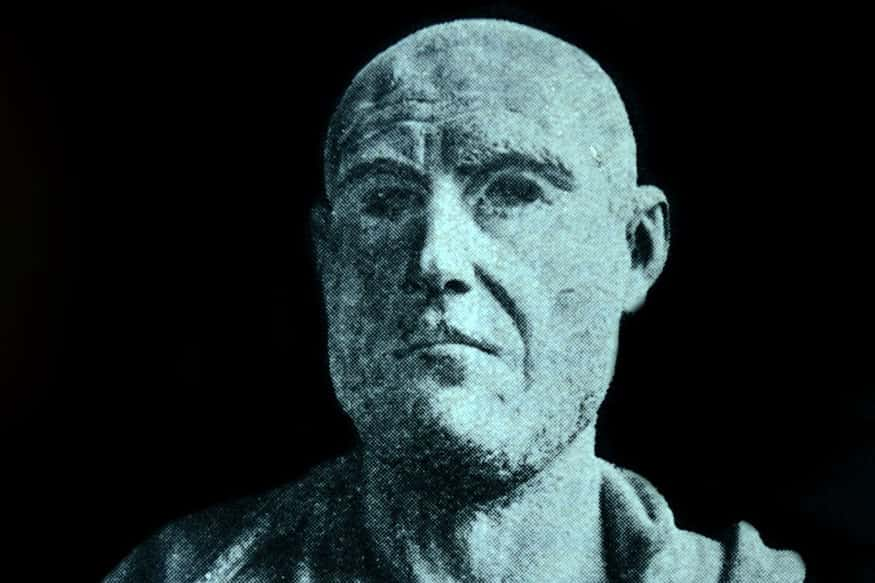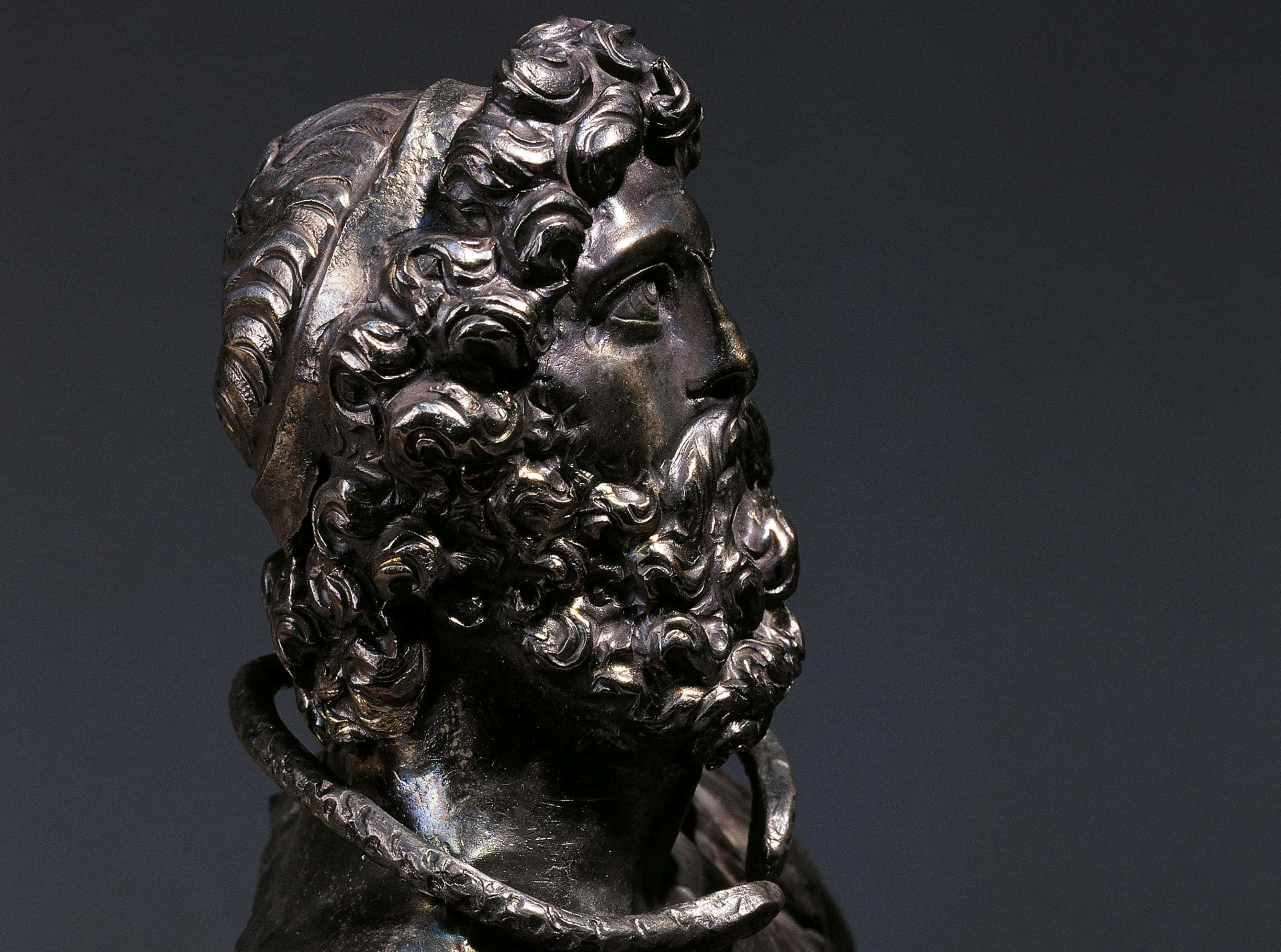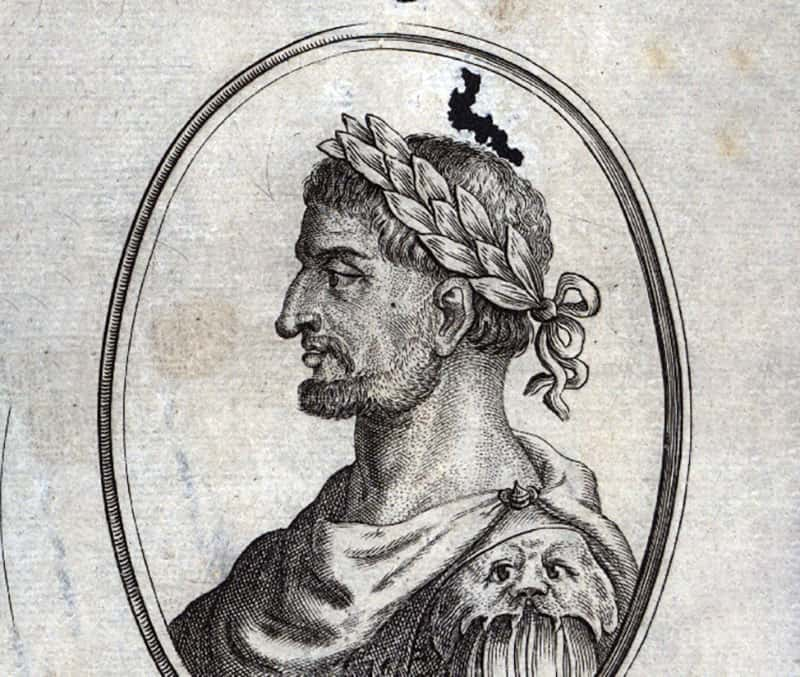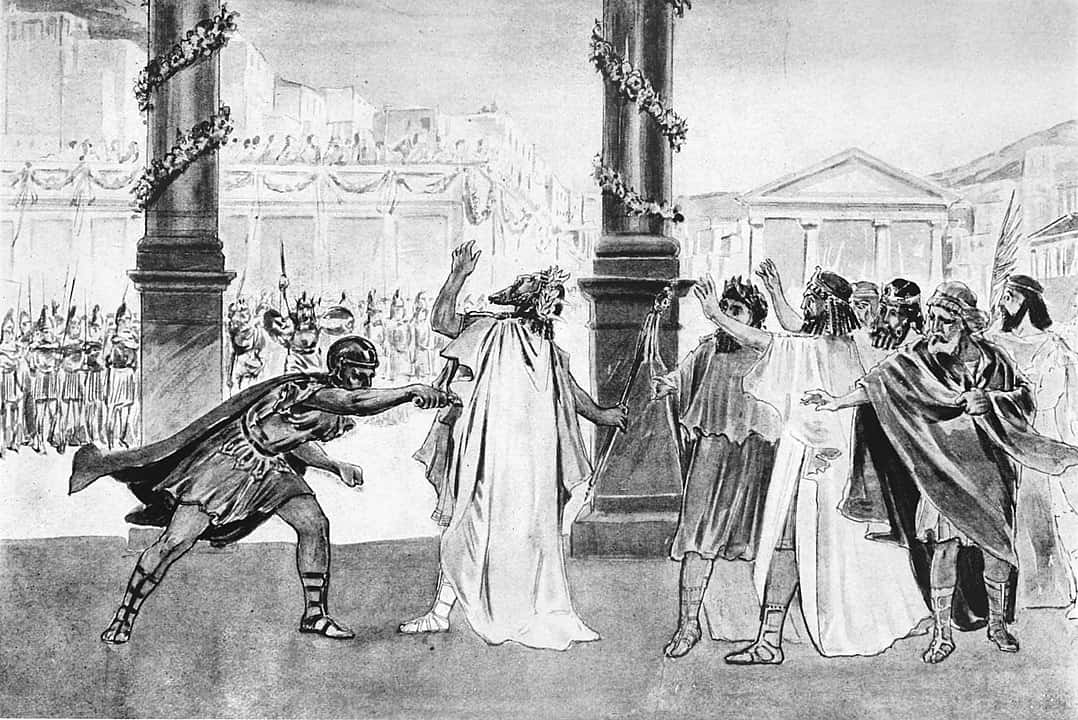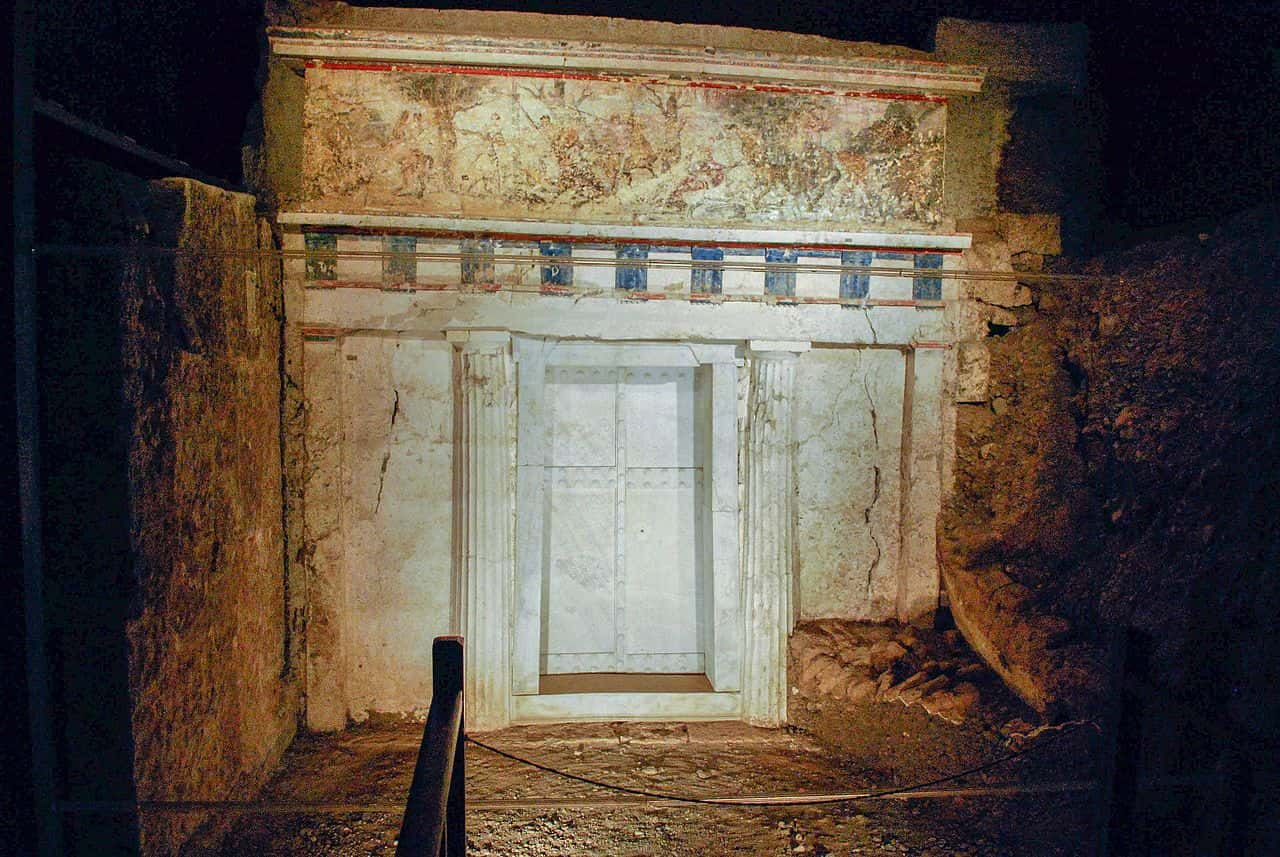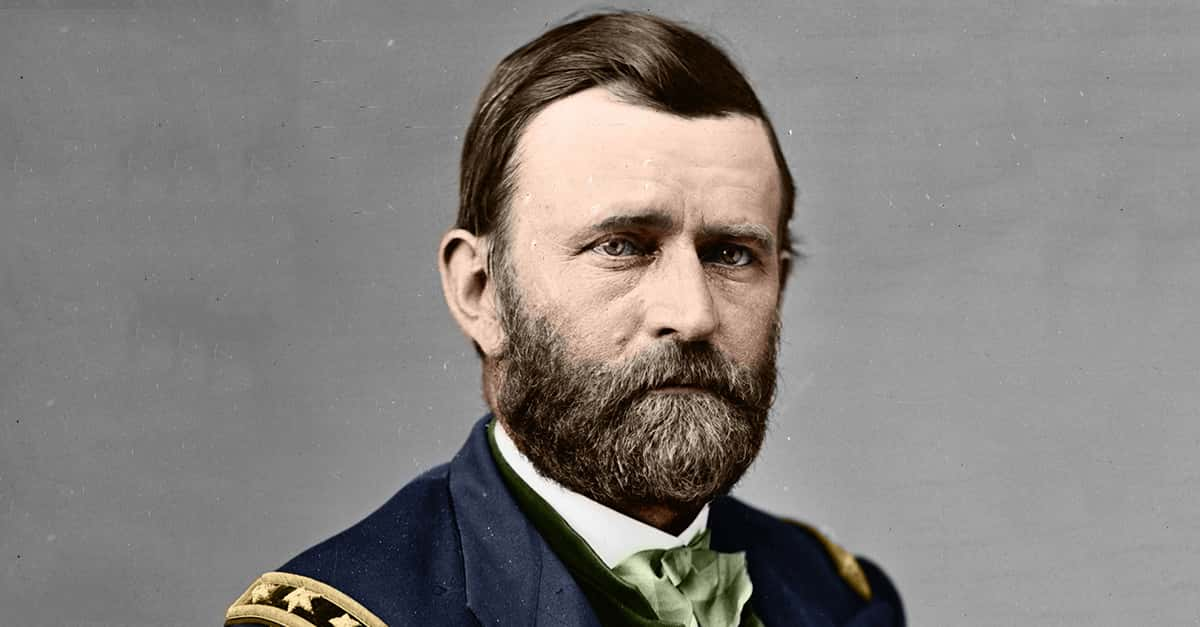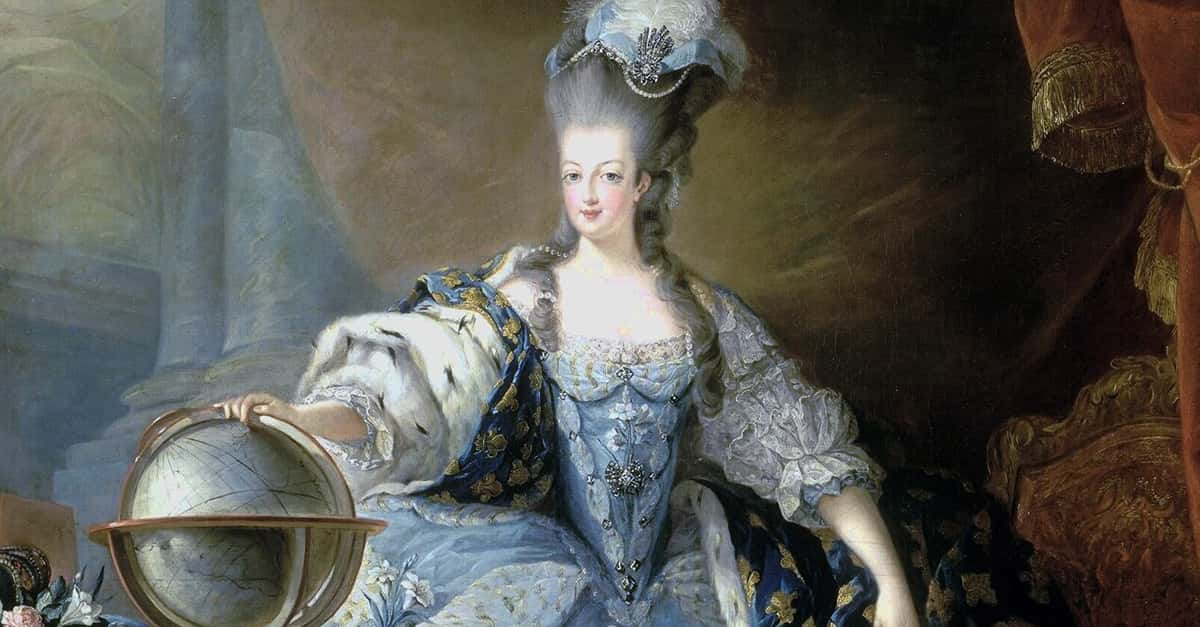You know Alexander the Great, but he wouldn't be anything without his dear old dad, King Philip of Macedon. Born into the bloodthirsty Macedonian royal family, Philip survived the game of thrones to turn his backwater kingdom into the greatest power in Greece. But fortunes could turn quickly in Ancient Greece, and just as Philip was on top of the world, it all came tumbling down.
1. He Lived In A Viper's Den
Born in 382 BC to King Amyntas III of Macedon and his queen Eurydice, Philip was the couple's third child. You might think that left him pretty far down the line of succession—but keep this in mind. Ancient Macedon was an incredibly brutal place. If you were tough enough to hack it, there was ample room for...let's call it "upward mobility".
And Philip would soon prove the toughest guy around—although his father wouldn't be there to see it.
2. He Lost His Father
Philip of Macedon barely got to know his father. Amyntas spent all of his reign trying to fortify Macedon's precarious position in the Greek world—with little success I might add. By the time Philip was 12, Macedon was still a periphery player in Classical Greece at best, and Amyntas was out of time. He succumbed to sickness when Philip was only 12.
That meant Philip's older brother Alexander became king next. It wouldn't take long for him to learn just how brutal Macedon was.
3. He Had An Evil Stepdad
The Macedonian court had enough sex and intrigue for an HBO show. When Amyntas passed, one of his cronies, Ptolomy, shacked up with Philip's mom. He wasn't just in it for the nookie though—he had his eyes firmly on the throne. So what did he do? Start scheming behind the scenes to turn people against Alexander?
Nope, that's too complicated. He just had Alexander eliminated. Nice and simple.
4. His Stepdad Sent Him Away
Not quite sure how Ptolomy explained the whole "I killed your son" thing to Queen Euridike, but he wasn't quite finished with her children. Lucky for Philip, though, his bloodlust was sated for now. But he had something else planned for Philip. Ptolomy installed a puppet king so that he could act as regent, then sent Philip away to live as a hostage in a foreign land.
If Ptolomy had his way, he'd never have to see his slampiece's kid ever again. Well, he never did—remember how brutal Macedon could be? Ptolomy's up next...
5. He Became A City Boy
Philip may have been a captive in a strange land, but to be honest, it was a pretty cushy gig. In the thriving metropolitan city of Thebes, he got a top-notch education. He learned all about diplomacy and military matters from some of the brightest minds in Greece. By the time he returned to Macedon, he was a young man with a lot to prove.
Maybe he'd have tried to get revenge on his mom's boyfriend—but he was too late.
6. His Stepdad Got What Was Coming
After Alexander, Philip's next brother, Perdiccas, became the king. The scummy Ptolomy hoped that he could control Perdiccas and rule through him as a puppet king. What did he think was going to happen? Within just a few years, Perdiccas grew up...and slew Ptolomy. Serves him right! So now Philip was back in town, ready to show off all he'd learned in Thebes.
Now all he had to do was wait until Perdiccas went belly up. If you've been paying attention, you should know that wouldn't take long.
7. He Wasn't A Great Uncle
Macedon wasn't in a better state now than it had been under Philip's dad, so Perdiccas still had his work cut out for him. A few years after Philip returned, Perdiccas marched off to battle. Before he left, he told Philip to look after his son, Amyntas IV. In case the worst should happen, it would be up to Philip to protect the young king until he came of age.
He didn't yet know that the worst was going to happen—or that Philip was going to betray him.
8. He Took The Throne For Himself
Shocker: Perdiccas never came home; he fell in battle. That made Amyntas IV the new king...except, Philip had other ideas in mind. Amyntas was just a little kid, and Philip wasn't interested in the regency. Instead, Philip just proclaimed himself the new king, and there wasn't much anyone could do to stop him.
If anyone was against the idea, they stayed quiet. Soon, Philip proved to be more of a king than his father or either of his brothers had been.
9. He Didn't Have An Easy Job
When Philip became the King of Macedon, he had his work cut out for him. None of his predecessors had been particularly effective, and he had enemies encroaching from all sides. Plus, his brother had just lost a battle against the nearby Illyrians, taking many good Macedonian men down with him.
Philip had big dreams, but it wasn't going to be easy. By the time he was done, Philip of Macedon would accomplish more than just about any Greek in history.

History's most fascinating stories and darkest secrets, delivered to your inbox daily.
10. He Had Foes On All Sides
Ancient Greece was a mess of different city-states that existed in a near-constant state of conflict. What that meant for the new King Philip was that the Paeonians and Thracians were sacking towns on his eastern borders. Meanwhile, the Athenians were approaching from the coast, hoping to oust Philip and install a puppet of their own. Philip was going to need to pull off every trick in the book—so that's what he did.
11. He Dealt With It
First, Philip dealt with the Paeonians and Thracians through diplomacy. He promised them great tributes if they backed off, and they did just that. Who doesn't like money? Next, he led his men against the Athenians and defeated their force of 3,000 hoplites. The Athenians turned and fled, realizing that this new Macedonian ruler would be no easy meat.
Whew. Philip now had some breathing room—but he wasn't about to start taking it easy.
12. He Knew How To Fight
Philip's victories strengthened his place as king—so why not go from strength to strength? He recruited heavily for the Macedonian army, nearly doubling it in the first few years of his reign. He pushed them hard but rewarded those who excelled. Men who impressed him could quickly find themselves rising through the ranks—with their pockets full.
Soon, Philip of Macedon had created maybe the finest fighting force in all of Classical Greece. Then, he gave them a secret weapon.
13. He Revolutionized Combat
Philip brought an entirely new way of fighting to his new army, creating the infamous Macedonian phalanx. He equipped his infantry with extremely long spears called sarissa. In battle, the men would stand shoulder to shoulder with their shields up and their spears out. Picture a hedgehog with razor-sharp, 20-foot-long metal spears...made up of some of the fiercest warriors the world had ever seen.
If that doesn't impress you, well then: The results would soon speak for themselves.
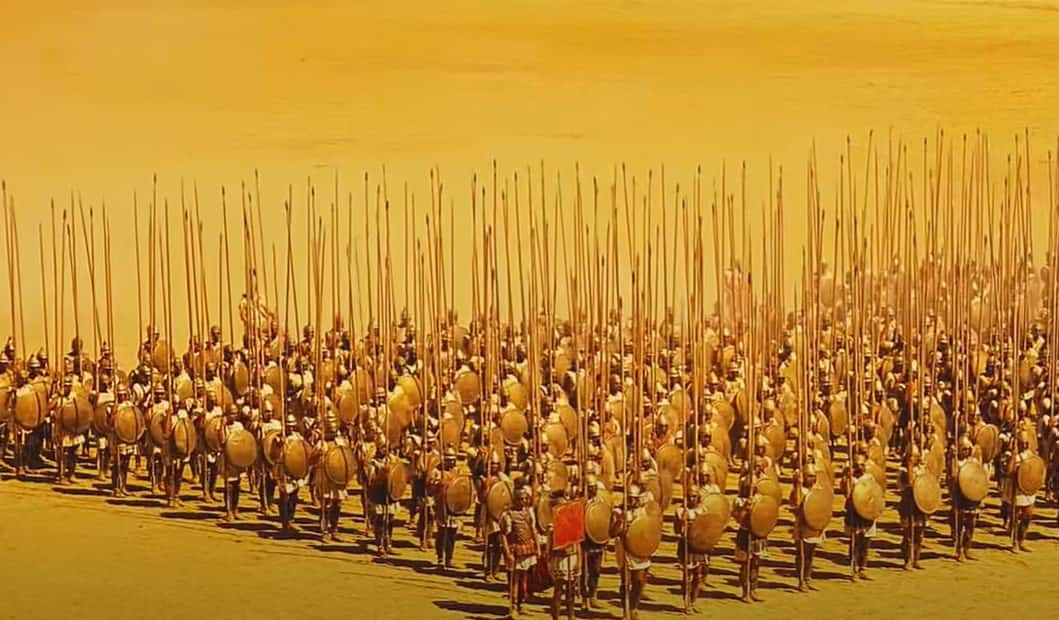 Alexander (2004), Warner Bros.
Alexander (2004), Warner Bros.
14. He Found His First Queen
What's a king without a queen? Philip was revolutionizing the army, but he needed to find a nice lady and start making lots of little princes and princesses (Ok, let's be real: He wanted princes). Soon, he married Audata, the daughter of his rival king Baryllis of Illyria. Sure, the Illyrians had just slaughtered a bunch of Macedonians, but also, they got rid of Philip's brother for him.
One marriage and call it even I guess? Not exactly. Philip still wanted revenge.
15. He Turned On His In-laws
Philip married Audata in large part to barter a truce with Illyria—and then he almost immediately turned around and invaded his new wife's homeland. With the new Macedonian phalanx, he made short work of his new in-laws. How's that for a welcome to the family? Since women in Ancient Macedon had few rights, there wasn't much Audata could do about it.
And then Philip had to go and put salt in the wound.
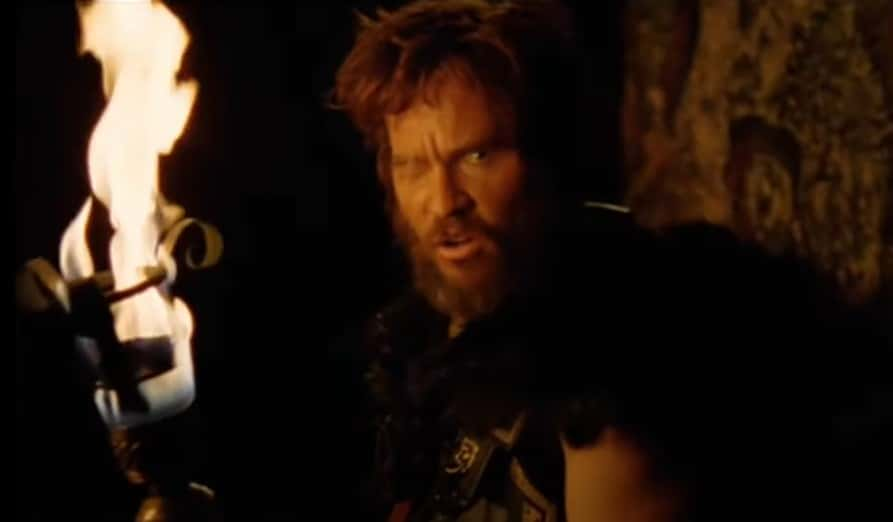 Alexander (2004), Warner Bros.
Alexander (2004), Warner Bros.
16. He Married Again
One wife was not enough for a guy like Philip, so almost as soon as his first marriage was consummated, he turned around and did it again! This time the "lucky" lady was a Molossian princess. Maybe you've heard of her; her name was Olympias. If you haven't, then you've definitely heard of the son she bore Philip a year later: His name was Alexander.
 Alexander (2004), Warner Bros.
Alexander (2004), Warner Bros.
17. ...And Again...And Again...
I know what you're thinking: How did Philip of Macedon handle two wives!? Well, he didn't...he handled seven. On top of Audata and Olympias, there was Phila, Nicesipolis, Philinna, Meda, and Cleopatra. Was he compensating for something?
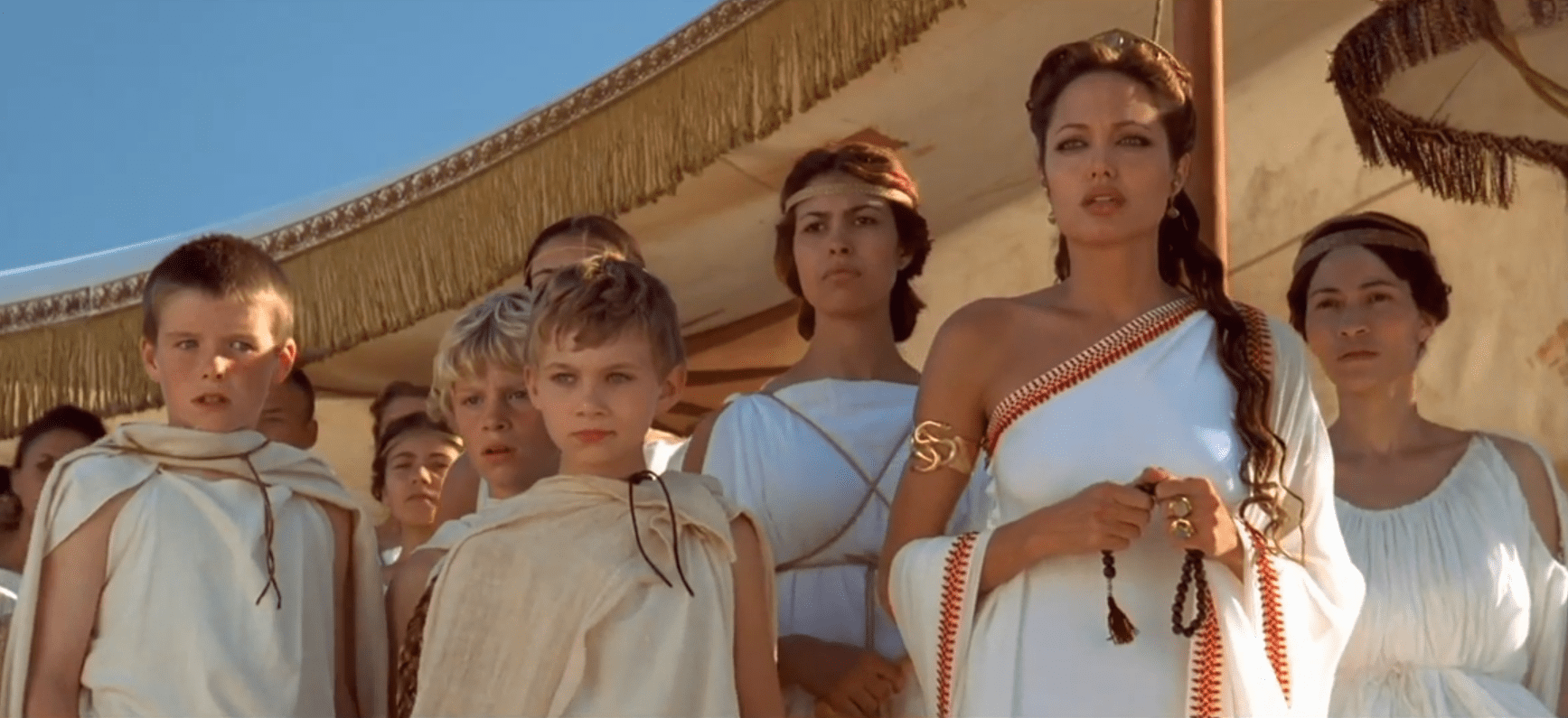 Alexander (2004), Warner Bros.
Alexander (2004), Warner Bros.
18. His Wife Had A Vision
Of all Philip's wives, Olympias was definitely the most ambitious. She allegedly claimed that the night before she consummated the marriage with Philip, she dreamed that a thunderbolt struck her womb, creating a flame that spread far and wide. To an Ancient Greek, that sure sounded like Zeus had maybe just blessed her womb to create a great conqueror?
Olympias clearly wanted her kid to be number one in Philip's eyes. Lucky for her, he was.
 Alexander (2004), Warner Bros.
Alexander (2004), Warner Bros.
19. The Gods Smiled On Him
A dream about a lightning bolt was one kind of omen, but Philip got an even better one on the day Alexander was born. They say good news comes in threes, and that day, Philip learned that his son Alexander was born, that one of his generals had won a great battle, and that his horse had won at the Olympic Games.
That's a triple whammy if I'd ever heard one! But it wasn't all going to be good news for Philip. He was about to get a gruesome reminder of that.
20. He Lost An Eye
A year after Alexander's birth, Philip was off fighting yet another battle. This time, he besieged the city of Methone, a key Athenian port. Things went awry, and while Philip escaped with his life, he didn't quite leave in one piece. He suffered an injury to his right eye, and there wasn't much Ancient Greek medicine could do to help him.
The only option was to remove the eye surgically. And in case you're wondering, Ancient Greeks didn't have much in the way of anesthesia.
 Alexander (2004), Warner Bros.
Alexander (2004), Warner Bros.
21. He Didn't Always Win
Philip of Macedon took the lost eye in stride—if anything, now he looked like an even fiercer warrior! He took a minute to recover, then turned around and invaded Thessaly. But for the first time, he faced the sting of defeat. He lost two battles in a row and had to return to Macedon with his tail between his legs.
But Philip wasn't going to take that lying down. He was going to come back—and this time, he wanted revenge.
22. But He Got Even
The next summer, Philip wanted to prove that no one beats him twice. He amassed nearly 25,000 men and marched right on back to Thessaly. This time, he ended up on top. 6,000 of his rival's men fell at the Battle of Crocus Field, and he took another 3,000 prisoner. If those men thought they were lucky, they were wrong. Philip had something even worse planned for them.
23. His Wrath Was Brutal
For an Ancient Greek, falling in battle was a heroic way to go out. Philip didn't grant his prisoners that luxury. Soon after the battle, Philip had the 3,000 men he captured drowned like rats. There was to be no honorable end for Philip's enemies. But he wasn't done fighting yet. Philip continued to grow more and more powerful, and soon, he had the attention of the most powerful state in Greece.
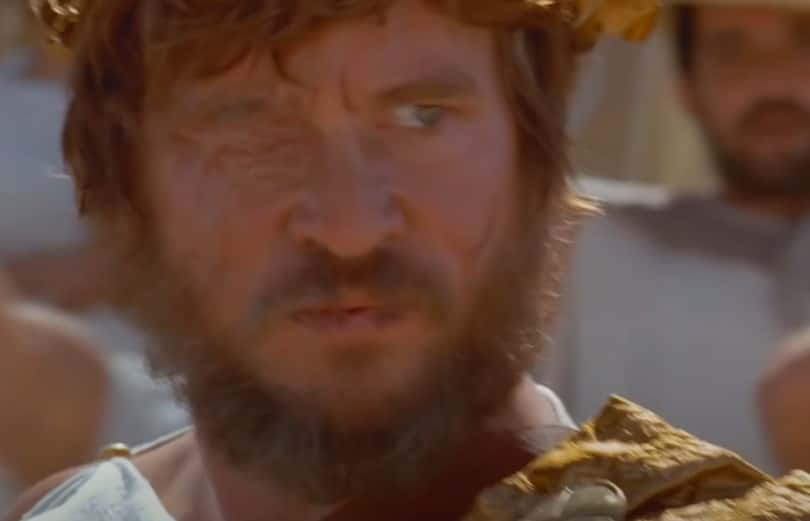 Alexander (2004), Warner Bros.
Alexander (2004), Warner Bros.
24. He Was The Real Deal
Philip of Macedon spent the early days of his reign fighting in the north of Greece, staying mostly clear of the southern states. But eventually, his power grew to the point that Athens, one of Greece's most powerful cities, saw him as a threat. The two were on a collision course, and it was only a matter of time before it came to blood.
But while conquest filled Philip's head most of the time, he still had something else to worry about. What about his son Alexander?
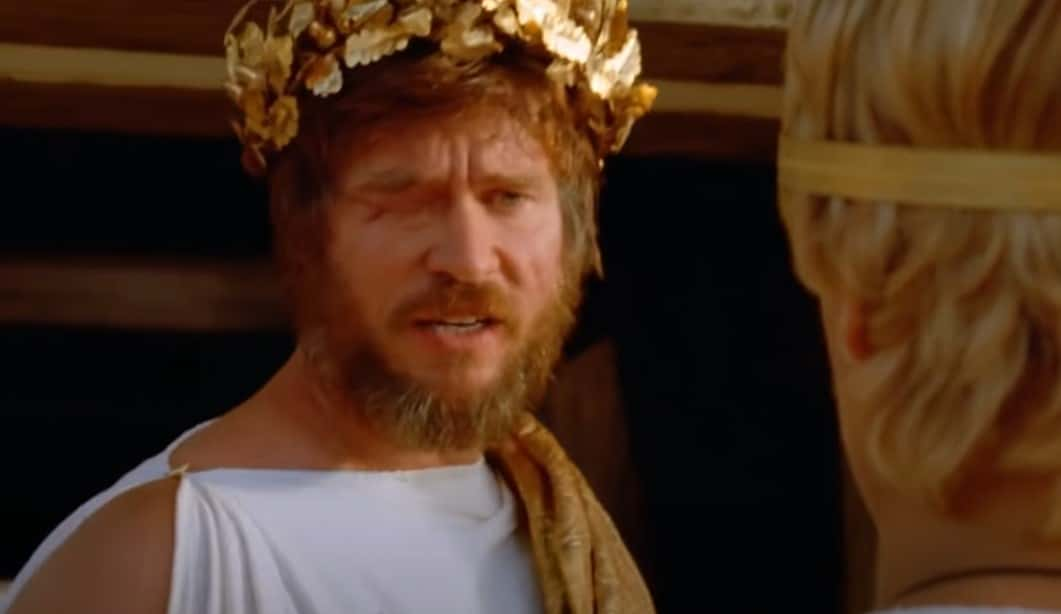 Alexander (2004), Warner Bros.
Alexander (2004), Warner Bros.
25. He Found His Golden Boy
Alexander was the kind of heir every king dreams of. He first noticed the spark of greatness in the boy when Alexander was 10 years old. One day, a trader tried to sell Philip of Macedon a horse. When Philip tried to mount the beast, it reared and bucked, refusing to be tamed. Philip said, "Thanks, but no thanks" and started on his way—until Alexander stopped him.
 Alexander (2004), Warner Bros.
Alexander (2004), Warner Bros.
26. He Saw Great Things
Alexander asked if he could try and tame the horse—and that's just what he did. Philip, bursting with pride, tearfully kissed his son and said, "My boy, you must find a kingdom big enough for your ambitions. Macedon is too small for you". He was right about that. Bucephalus, as Alexander named the horse, would eventually carry him as far as India.
27. He Found The Best Teacher
Philip saw greatness in his son, so he made sure to find him the best teacher in Greece. At 13, he sent the boy off to learn under Aristotle, one of the greatest minds in history. As payment, Philip agreed to rebuild Aristotle's hometown of Stageira. Had Philip himself been the one to burn it to the ground in the first place? Sure, but who's counting?
With Alexander dealt with, it was time to get back to what Philip did best.
 Alexander (2004), Warner Bros.
Alexander (2004), Warner Bros.
28. His Work Was Never Done
A conqueror's work is never done. Next, Philip besieged the city of Olynthus, which harbored two of his half-brothers, Arrhidaeus and Menelaus. These two dared to claim Macedon's throne, and Philip wasn't going to take that lying down. Originally Philip's ally, Olynthus was not only hiding the two pretenders, but they turned around and formed an alliance with Athens against him.
I wonder how Philip reacted to that?
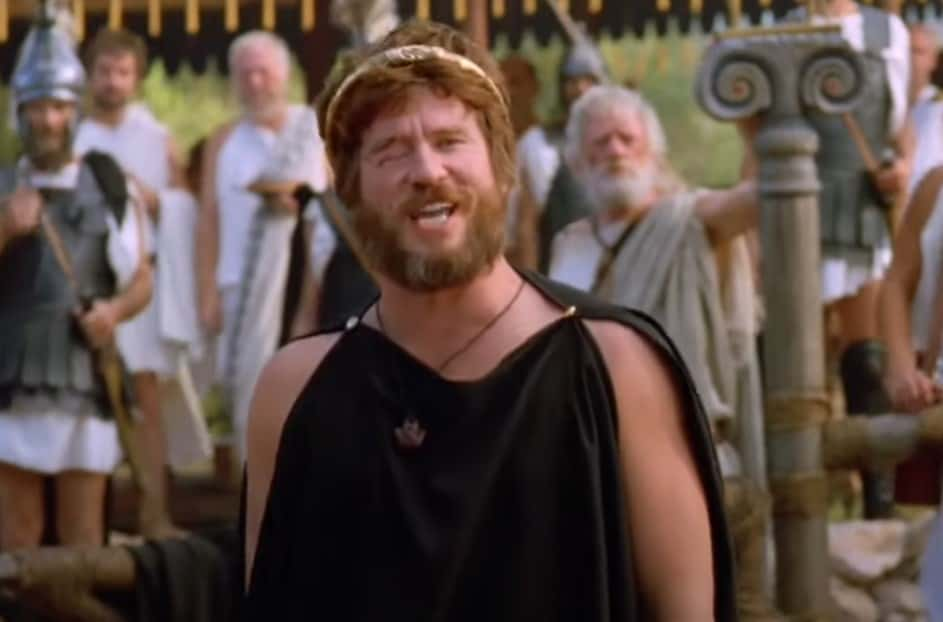 Alexander (2004), Warner Bros.
Alexander (2004), Warner Bros.
29. He Laid A Path Of Destruction
Maybe Olynthus thought that Athens could save them from Philip. They were wrong. Athens couldn't send men to reinforce the city, and after a brutal siege, Philip conquered Olynthus and razed it to the ground. Once that was done, he just kept rolling, destroying city after city on the Chalcidian Peninsula. What can you say, Philip just loved razing!
30. His Son Lived Up To The Hype
By age 16, Alexander was done learning under Aristotle and he returned to Macedon. He began acting as regent whenever Philip went off to fight (which was pretty much constantly). Thankfully, young Alexander was more up to the task. He even managed to lead his own force against a revolt in the North, conquering new territory and founding his very own city, Alexandropolis.
Talk about making papa proud! So when it came time to finally face down the Athenians and their allies, Philip wanted his son by his side.
 Alexander (2004), Warner Bros.
Alexander (2004), Warner Bros.
31. They Took Down Athens
The Battle of Chaeronea was the pinnacle of Philip's reign. With his teenage son leading the left wing and him on the right, Philip and the Macedonians completely outmaneuvered the Athenians. With brilliant tactics still studied by historians today, Philip and Alexander routed the enemy. For Athens, it was time to wave the olive branch.
 Alexander (2004), Warner Bros.
Alexander (2004), Warner Bros.
32. They Couldn't Beat Him
In a move that would have been unthinkable just a few years earlier, Athens began peace negotiations with the once-insignificant Macedonians: No matter how humiliating, peace was better than having Philip continue south. This was just in time, too, because the Greeks were about to have an even greater enemy to face...
33. He United Greece For The First Time Ever
Game respect game, and the Greeks all realized that Philip of Macedon was the real deal. With his missing eye from one battle and his slight limp from another, Philip was the ideal vision of a warrior king. So when the Persian Empire to the east started threatening the Greek world once again, they did the unthinkable: The factional city-states of Greece actually teamed up.
The enemy of my enemy is my friend, so they say. And guess who they decided to lead their new alliance?
34. He Reached The Top
There was no question: When the Greek states created the League of Corinth, Philip of Macedon had to be the leader. He'd spent his entire reign wiping the floor with almost everyone he faced in battle. But Philip wasn't going to be alone. He had an extremely promising new general by his side: His son Alexander. But while Alexander was a promising general, he was far from the perfect son...
 Alexander (2004), Warner Bros.
Alexander (2004), Warner Bros.
35. His Son Was Anxious
Trouble started when Philip married his seventh and final wife, Cleopatra Eurydice. That wasn't particularly scandalous. He did already have six wives. But Olympias knew a threat when she saw one. She wasn't Macedonian herself, which meant Alexander was only half-Macedonian. Cleopatra, on the other hand, was Macedon born and bred.
Any son of hers would be a full-blooded Macedonian. And that wasn't all...
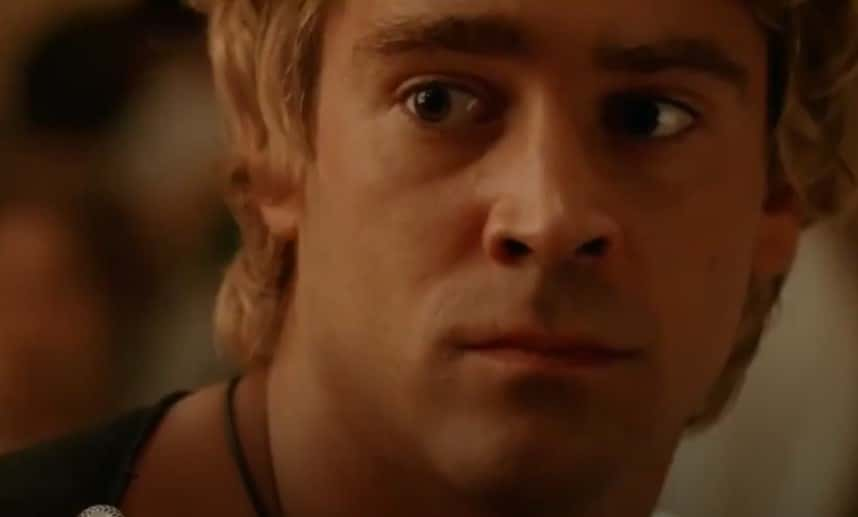 Alexander (2004), Warner Bros.
Alexander (2004), Warner Bros.
36. His New Father-In-Law Had A Big Mouth
Cleopatra was the daughter of one of Philip's generals, and he was over the moon. His own daughter! Wife to the great warrior king! Like many a father of the bride, Attalus had a little too much to drink at the nuptials—and he let slip his ambitions for the marriage. When Olympias heard what he shouted, her blood ran cold.
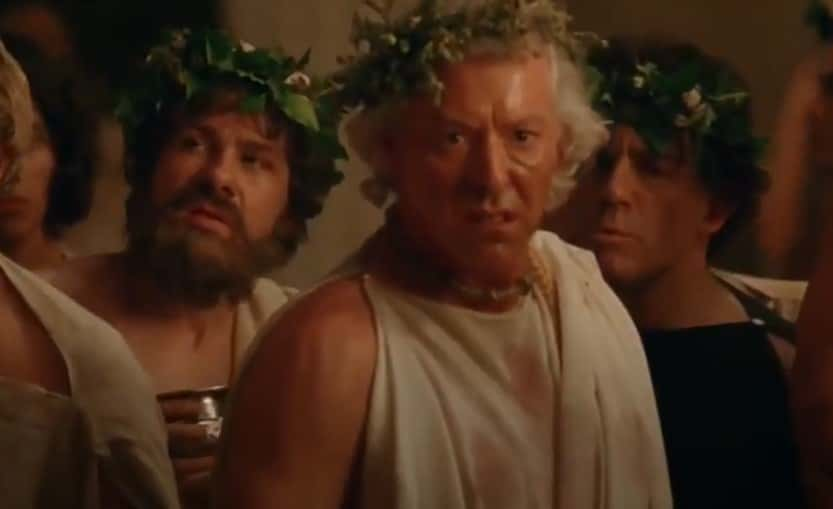 Alexander (2004), Warner Bros.
Alexander (2004), Warner Bros.
37. Another Heir Threatened Alexander
That night, Attalus loudly prayed to the gods that this union would produce a legitimate heir for Philip. To Olympias, this meant one thing: Her son Alexander was illegitimate. For any prospective heir, that would be bad news, but remember, this was Macedon. If you stood in someone's way, you might just wake up dead. Olympias had to act fast.
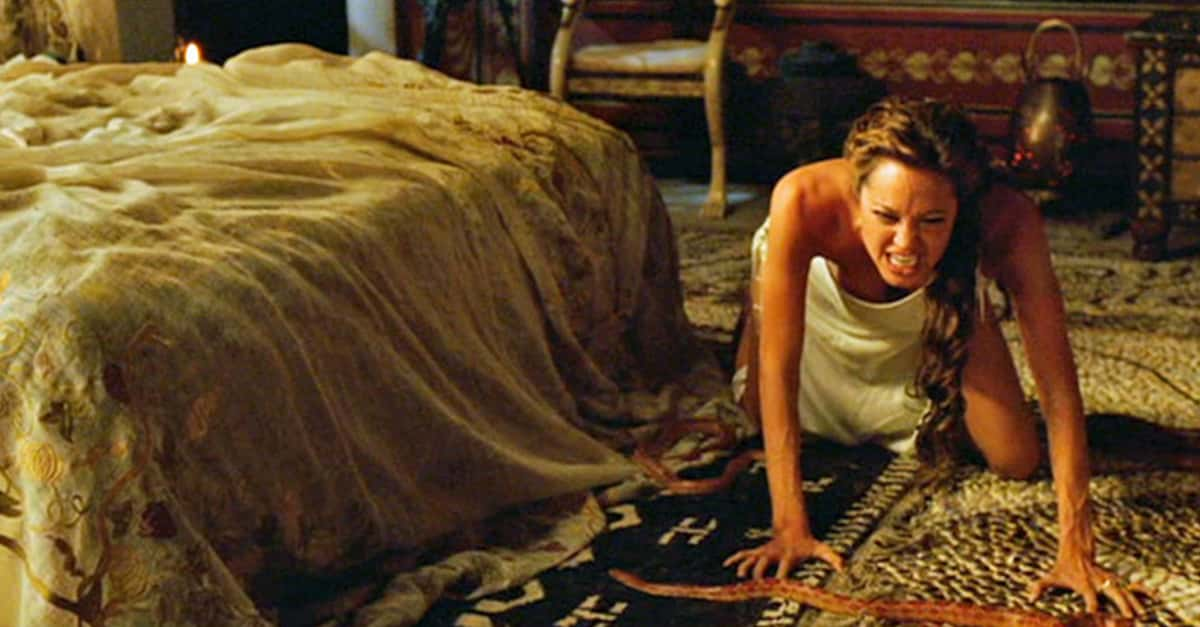 Alexander (2004), Warner Bros.
Alexander (2004), Warner Bros.
38. They Ran For Their Lives
Together, Olympias and Alexander fled Macedon, eventually finding refuge in Illyria not too far away. Little did they realize, Philip had no plans of disowning Alexander. Philip adored Alexander! That didn't stop the pair of them from plotting against Philip from the sidelines though—and it almost ruined everything.
 Alexander (2004), Warner Bros.
Alexander (2004), Warner Bros.
39. They Schemed Behind His Back
All Alexander and Olympias had to do was trust Philip wouldn't betray them, but they can maybe be forgiven for worrying that the ruthless one-eyed warrior might not be all warm and fuzzy with them. Alexander began meddling in Macedonian affairs, trying to make deals with the Persians behind Philip's back. Unlucky for him, Philip heard about his scheming—and he wasn't impressed.
 Alexander (2004), Warner Bros.
Alexander (2004), Warner Bros.
40. They Needn't Have Worried
Alexander might have impressed Philip with his horse-taming and martial prowess, but the kid was still a teenager who needed guidance. Philip caught wind of Alexander's meddling, and he...gave his son a stern talking to. He had already decided that Alexander was his heir, but the boy had a lot to learn. In the end, Alexander got off with little more than a warning—though Philip did exile several friends who had helped Alexander.
Philip didn't have time to fight with Alexander in either case. He was about to face his biggest challenge yet.
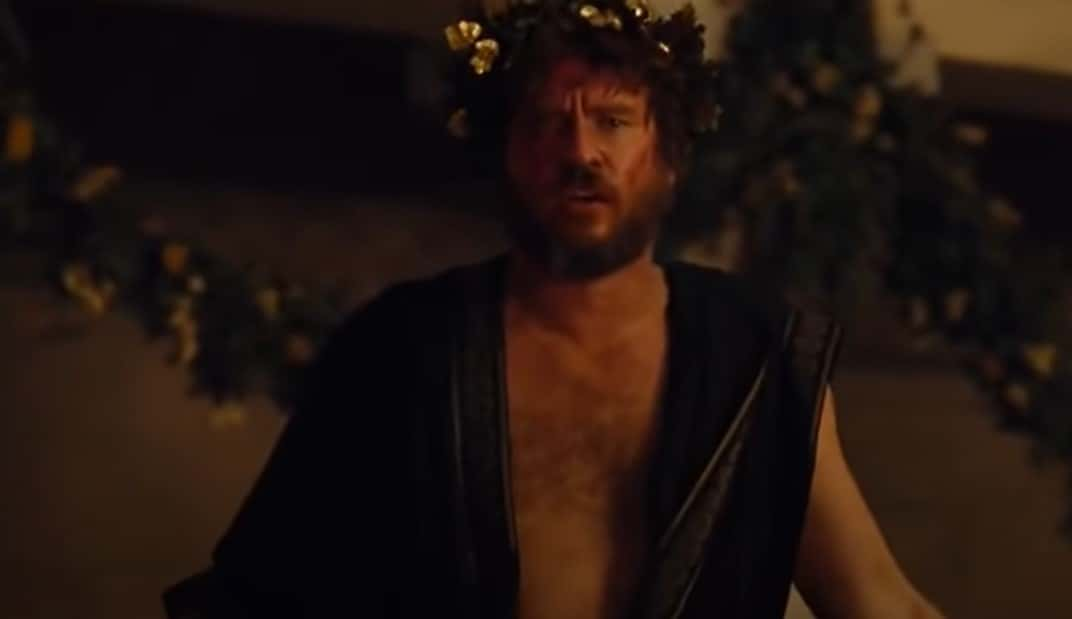 Alexander (2004), Warner Bros.
Alexander (2004), Warner Bros.
41. He Knew His Enemy
Philip had big dreams, and he realized early that he'd probably have to come up against the Persians eventually. So, long before the League of Corinth became a thing, he started learning about them. He allowed several Persian exiles to live in Macedon. From them, he learned about Persian affairs and culture. He likely even incorporated some of their ideas into his own kingdom.
So when Philip was finally ready to face down the Persians, he was very ready. Unfortunately, he was out of time.
 Alexander (2004), Warner Bros.
Alexander (2004), Warner Bros.
42. He Started The Invasion
In 336 BC, 17 years into his reign, Philip sent a force of 10,000 men into Asia Minor. The Persians ruled there, but most of the settlements were inhabited by ethnic Greeks. This was to be the first step toward a full-scale invasion of the East. First, though, Philip had matters to attend to back home.
43. He Lagged Behind
When you have seven wives, you end up having a lot of kids—and that means you have to go to a lot of weddings. Around the same time his men sailed for Asia Minor, Philip and most of his royal court attended the marriage of his daughter Cleopatra (Alexander's sister) to Alexander I of Epirus. Since Philip was a big cheese by then, many Greek dignitaries were in attendance.
Philip had defeated many of these men in battle before—but in the end, the threat came from within his own ranks.
44. He Stood Alone
Philip of Macedon had bodyguards, but this wasn't quite the secret service—and he wouldn't have it any other way. With the wicked scar on his face, he wanted to present the image of an invincible warrior king, not some weakling who needed thugs around him at all times. Unfortunately, that turned out to be hubris, and it cost him in the end.
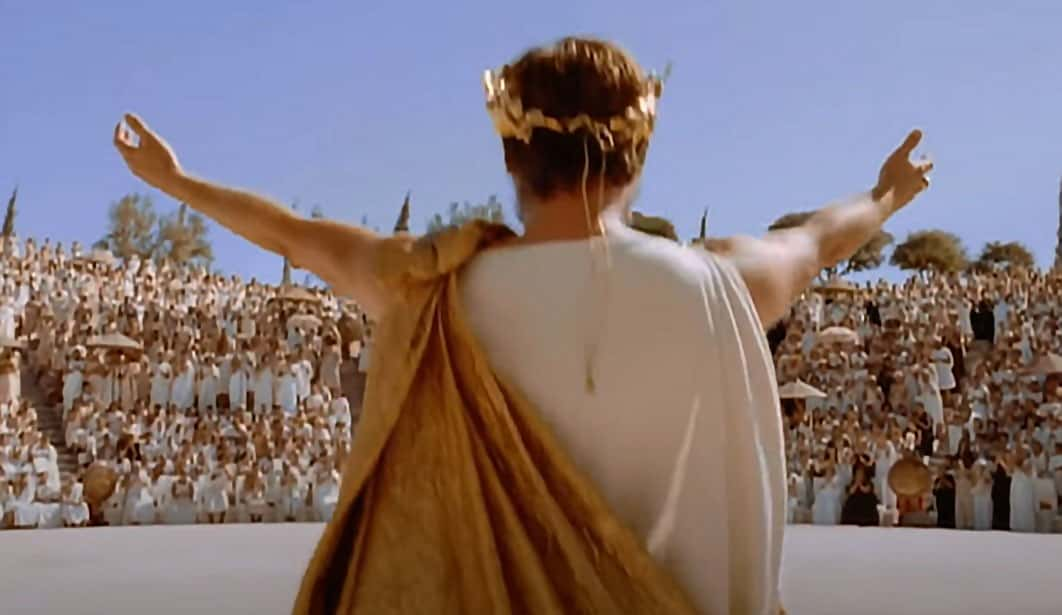 Alexander (2004), Warner Bros.
Alexander (2004), Warner Bros.
45. Diplomacy Failed Him
During the festivities, Philip entered the town's theatre alone and unprotected. He wanted to appear amenable and approachable to the many dignitaries in attendance. Though he liked to get his way at the tip of a sword, he wasn't completely against diplomacy. And that's how he ended up at the tip of a sword.
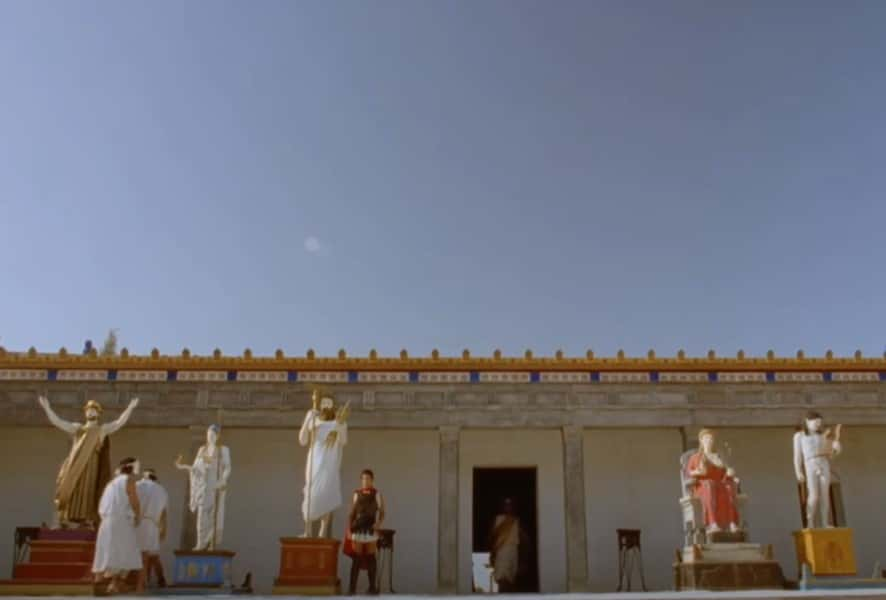 Alexander (2004), Warner Bros.
Alexander (2004), Warner Bros.
46. His Own Man Betrayed Him
As Philip stood alone, one of his own bodyguards suddenly approached him, Pausanias of Orestis. Philip didn't have time to react before Pausanias had a blade in his ribs. The attacker immediately turned and fled to a waiting horse to make his getaway—but he didn't get much further. His horse tripped, and Philip's remaining bodyguards caught up and gave him a taste of his own medicine.
They avenged their fallen king, but they'd still failed. Philip II of Macedon was dead.
47. No One Knows Why
To this day, no one can say for sure exactly what Pausanias's motives were. Philip was extremely well-regarded by his countrymen, and such a sudden and violent end shocked the entire Greek world. The most likely reason appears to be something incredibly petty: It's likely that one of Philip's friends offended Pausanias.
Whatever the reason, what was done was done. Philip would never live to see his dream of defeating the Persians come true. Though his son would more than do him proud.
48. His Son Fulfilled His Dream
Alexander the Great went on to become the most successful general in history. Within two years of becoming king, he followed through with Philip's grand plans. He brought a Greek force into Asia Minor, and spent the rest of his life rampaging through Persia and beyond, reaching as far east as India. He used the tactics that Philip of Macedon had perfected in Greece and never lost a single battle in all that time.
Alexander may have been the greatest conqueror in history, but he owed it all to his dear old dad.
 Alexander (2004), Warner Bros.
Alexander (2004), Warner Bros.
49. The Spartans Gave Him A Legendary Reply
Philip is often mentioned in a famous story about the Spartans. Everyone knows how fierce the Spartans were, so before invading the Spartans' homeland of Laconia, Philip gave them a choice. He told them, "If I invade Laconia, I shall turn you out". The Spartans' infamous reply consisted of only a single word: "If".
What most of the stories don't tell you is what happened next.
50. Then He Obliterated Them
The Spartans' one-word reply was undeniably fierce—but their bluster couldn't do anything to stop Philip and his Macedonian phalanx. Philip did proceed to invade Laconia, where he laid the region to waste. The Spartans may have been Greece's fiercest warriors in the past, but Philip was the big man on campus now.

